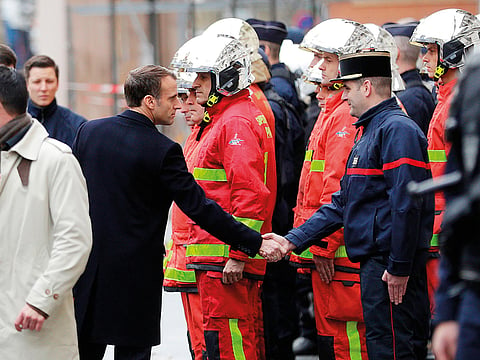Macron learns the hard way: green taxes carry political risks
French president faces protests over fuel tax increase

Paris: When Emmanuel Macron rose to power, he put the environment at the heart of his agenda. Eighteen months later, anger over those policies has stoked protests that are a huge challenge for the French president.
Rioters torched cars and buildings in central Paris on Saturday following two weeks of protests caused partly by higher fuel taxes which Macron says are needed to fight climate change.
Some protesters called for him to resign.
Macron’s plight illustrates a conundrum: How do political leaders’ introduce policies that will do long-term good for the environment without inflicting extra costs on voters that may damage their chances of re-election? It is a question facing leaders across the world as delegates hold talks in the Polish city of Katowice this week to try to produce a “rule book” to flesh out details of the 2015 Paris Agreement on fighting climate change.
“Clearly, countries where inequalities are the highest are the ones where these kinds of pushbacks are mostly likely,” Francois Gemenne, a specialist in environmental geopolitics at SciencesPo university in Paris, said of the political risks.
Naming Italy, the United States and Britain as countries where environmental moves could risk a voter backlash, he said: “I guess it’s one of the reasons why populist leaders tend to be very sceptical about climate change and environmental measures.” The protests in France have inspired a similar movement in neighbouring Belgium, where protesters took to the streets on Friday.
There have also been small-scale protests in Canada over Prime Minister Justin Trudeau’s plan to impose a federal carbon tax on provinces unwilling to combat climate change.
What was once widely seen by governments as a win-win transition to cleaner energies now looks more like causing short-term costs with huge social disruption, followed by possible long-run gains.
Another challenge facing leaders is over how they use the proceeds from policies intended to help the environment: Should money raised from carbon taxes be used directly to combat climate change, or to plug holes in national accounts?
Carbon taxes
Macron said after the latest protests in Paris that he would convene ministers to discuss the crisis on his return from a G20 summit in Argentina. Prime Minister Edouard Philippe cancelled plans to go to Katowice for the climate change summit.
Macron introduced new carbon taxes to urge motorists to change behaviour and protect the environment.
Macron has watered down some of his campaign pledges on the environment since he took office, and his popular environment minister quit in August over the sluggishness of progress. But he has shown little willingness to compromise in the face of the protests.
The fuel tax is accompanied by other measures including incentives to encourage people to buy electric vehicles.
Unveiling a medium-term energy plan for France last week, he held out an olive branch by saying he would review fuel prices each quarter, but said the carbon taxes would stay.
His goal is for France to cut carbon emissions by 40 per cent by 2030 and boost the use of cleaner energies at the same time.
Emissions are currently rising and 75 per cent of energy use in France originates from fossil fuels.
“When we talk about the actions of the nation in response to the challenges of climate change, we have to say that we have done little,” he said.
Macron has also said he will fight to try to save the Paris climate agreement, which aims to keep global temperature rises to between 1.5 and 2 degrees Celsius, a critical threshold.
Scientists are increasingly concerned that countries are falling short on their targets and must be more ambitious. Yet citizens are worried about their immediate lives.
‘Policies of transition’
In Canada, addressing the question of how governments use the money raised from carbon taxes, Trudeau’s government has promised to return the money collected from the provinces directly to taxpayers.
But in France most of the revenue generated will be used to tackle the national budget deficit, increasing anger at Macron, who left-wing opponents call the “president of the rich”.
Of the €34 billion (Dh141 billion or $38.71 billion) the French government will raise on fuel taxes in 2018, a sum of only €7.2 billion is earmarked for environmental measures.
Simon Dalby, a specialist in the political economy of climate change at Wilfrid Laurier University in Canada, says carbon taxes should be part of wider measures to alter how people live, including better, greener transport and buildings.
“It is all about policies for transition to a post-fossil-fuel world, something that needs to be done quickly if the worst of the predicted climate disruptions are to be avoided in the coming decades,” he said.
Gemenne said the protests in France were unlikely to go away soon, and may emerge in other countries as they take more determined action on emissions.
The danger, he said, was inaction, or acting too late to prevent global warming. At the same time, politicians need to be able to show they were acting fairly and equitably.
Sign up for the Daily Briefing
Get the latest news and updates straight to your inbox



